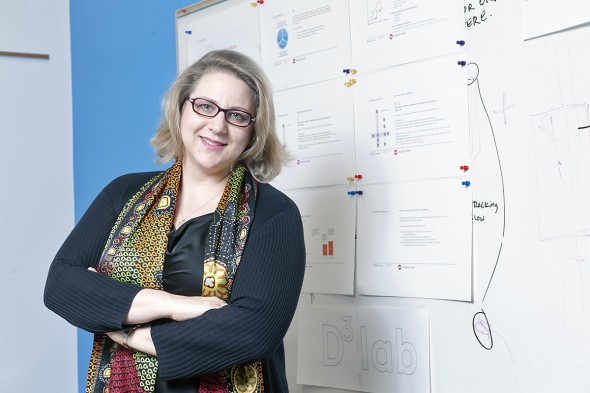Impact of corporate values on employees’ job satisfaction

Jelena Spanjol compared the values held by companies and their employees. Photo: Roberta Dupuis-Devlin/UIC Photo Services
If you work for a company that shares your values about the environment, you will have greater job satisfaction and be more creative, says Jelena Spanjol.
But if both you and your employer have a high level of concern, the effect is greatly magnified, her research shows.
The associate professor of marketing in the College of Business Administration (her name is pronounced Yell-EN-a Shpahn-JOHL) surveyed Australian engineers for the project.
“We decided to look at engineers because they develop the technical solutions to help firms become more sustainable,” Spanjol said, “rather than people in marketing, who are more concerned with product solutions and communication.”
The research, done with the help of two colleagues from the University of Wollongong and the University of Western Sydney, is the subject of an upcoming article in the Journal of Business Ethics.
“Our analysis did find that while congruency [of environmental values] always resulted in greater job satisfaction and creativity, it was magnified much more for companies that shared a high level of environmental concern,” Spanjol said.
Most of her research examines innovation, from the multiple perspectives of firm, marketing, employee and consumer.
“I’ve been conducting research on team dynamics and how openness to adopt or develop innovations is influenced when people share more or less the same motivational profile,” she said.
With another set of co-authors from Ruhr-Universität Bochum, Spanjol looked at German firms to answer the question, “Are employees really the most important stakeholder a company needs to take into account when investing in corporate social responsibility initiatives?”
The researchers interviewed more than 3,000 employees from small, large and mid-range firms.
They were asked if the companies they worked for, in addition to spending on sustainability, waste and pollution reduction, and philanthropy — “looking like a good corporate citizen,” Spanjol said — also put resources into the workplace to enhance employees’ physical and psychological well-being.
“Investing in external initiatives is great, but did the employees perceive their companies to have a portfolio tilted toward the outside, or did they see employers balance this by investing in training, fairness in employee evaluations, equality and diversity, and health care?” she said.
“Unless companies have balanced portfolios, they don’t really benefit in the long run from engaged employees who have job satisfaction and want to stick around.
“Companies are punished in terms of performance when all the attention is on the external, as returns to corporate social responsibility initiatives become negative.”
She compares this to the concept of “greenwashing,” where a corporation presents itself as environmentally progressive but actually isn’t.
Spanjol offered Walmart as an example of companies with an externally tilted social responsibility portfolio.
“Former labor secretary Robert Reich called it ‘Scrooge posing as Mother Teresa,’” she said.
In the classroom, Spanjol teaches in the Interdisciplinary Product Development curriculum.
The two-semester curriculum partners companies with student teams, typically having five members, that work on generating solutions and concepts for business.
Spanjol and other faculty members “train students from business, design and engineering to work across disciplines, understand the users and come up with marketable solutions,” she said.
“I’m the marketing professor and I have colleagues in engineering and graphic and industrial design, and we all speak to the same issues.
“We leverage each discipline’s unique perspectives.”
Spanjol grew up in Switzerland, although she spent much time in the former Yugoslavia, her parents’ native country.
She earned a bachelor’s degree in economics summa cum laude from Urbana-Champaign. Before returning to work on a Ph.D. in marketing, she spent two years as international marketing coordinator for Wolfram Research Inc., based in Champaign and Oxford, UK. She taught at Texas A&M for six years before joining UIC in 2006.
Spanjol lives in Highland Park with her husband, Adade Deganus, who works in corporate finance, and their sons. Mihajlo-Joshua, 8, and Gabriel-Aleksandar, 4.
They enjoy downhill skiing as a family and they’ve skiied in Switzerland, Utah and Granite Peak near Wausau, Wis.
Spanjol is an avid reader. One of her favorite authors is Mary Roach; she recently read Roach’s Gulp, about the digestive system, and Packing for Mars, about the peculiarities of space travel.
Spanjol reads “indiscriminately” from fiction and nonfiction, in three languages at a time.
She grew up speaking Serbo-Croatian. Since her home was in the German-speaking part of Switzerland, it was natural for her to learn that tongue. She studied French because the Swiss educational system requires learning another official language, and her town was on the French border.
Along the way, she picked up some Italian.
“I love languages,” she said.
